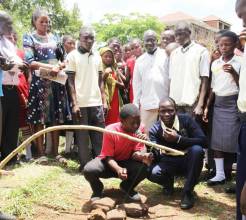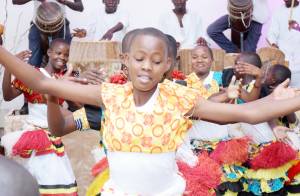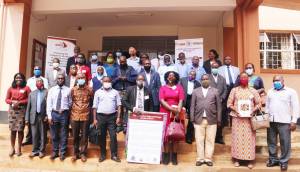Goals
- Transmit and promote cultural heritage through education among young people of Uganda
- Support and encourage young people to reflect on their valuable cultural heritage which can contribute not only to their identity but also to social cohesion, sustainable development, community empowerment and safeguarding.
- Enhance the value of heritage in Ugandan schools at different levels.
The Cross-Cultural Foundation of Uganda (CCFU) is a non-governmental organization that promotes the recognition of Uganda’s culture as vital for human development. CCFU’s objectives are to promote culture as a resource for development as well as to enhance cultural diversity, cultural identity and social cohesion. Through research, documentation, training and advocacy, CCFU supports communities and institutions in preserving and promoting their cultural heritage. The Foundation has contributed to the implementation of the 2003 UNESCO Convention for the Safeguarding of Intangible Cultural Heritage by supporting the production of training materials and by serving on the ICH Evaluation Body. It is . also accredited to the Inter-Governmental Committee and is a member of the Intangible Cultural Heritage NGO Forum.
In 2011, CCFU initiated a programme aimed at enriching heritage education in Uganda, which has consistently expanded over the last decade. Through this programme, CCFU has enhanced the value of heritage in schools at three different levels. The first, consisted of improving cultural heritage knowledge and skills through extra-curricular heritage clubs in schools, along with the development and use of a heritage education toolkit. The second level involved incorporating heritage as a formal subject of study in the Ugandan secondary school curriculum. Finally, as part of the third level, it assisted in the production of a bachelor’s degree course on ‘Intangible Cultural Heritage and Sustainable Development’ at the university level.
The Heritage Education Programme
CCFU decided to establish its Heritage Education Programme (HEP) that specifically addresses heritage education in secondary schools. This came as a response to concerns from communities where youth were disconnected from their heritage and cultural identity. To combat a colonial past where culture was seen as irrelevant or a hindrance to development, coupled with the contemporary influences of globalization and an absence of heritage education in the formal education system, the programme has created spaces where youth are encouraged to reflect on and embrace their cultural heritage. At these schools, Heritage clubs are formed and co-implemented with the school administration. Every year, the Programme expands and up till 2022, HEP has been implemented in a total of 30 districts and the heritage clubs have been formed in 175 secondary schools of Uganda.
The CCFU has also produced a Heritage Education Toolkit, which is currently in its third edition (2019). This resource book helps teachers and patrons run Heritage Clubs in their secondary schools, as well as assists club leaders in and out of school. It seeks to engage young people in interactive discussions on the value of cultural heritage in present times and contains activities to explore issues related to personal and community values. The Tool Kit is designed to promote creation of new knowledge through information and skills sharing, as well as experiential learning from interaction with well-informed persons of the community (teachers, community museum initiators and managers, practitioners, parents and other resourceful persons).
In addition to the Tool Kit, the CCFU conducts trainings for cultural leaders, cultural heritage club patrons and coordinators, to increase their capacity to run the heritage clubs. Furthermore, the club members are encouraged to participate in annual youth cultural heritage competitions which are intended to foster an appreciation of Uganda’s diverse cultural heritage. The winning drawings and narratives from these competitions are used to design and produce an annual Heritage Calendar, which is distributed throughout the country.
Integrating Heritage in the Secondary School Curriculum
The Foundation, in collaboration with various partners, advocates for a favourable policy environment to protect, develop and promote Uganda’s heritage in formal and non-formal education. Through the CCFU’s work with the National Curriculum Development Centre, cultural heritage has been incorporated in the new secondary school curriculum, which rolled out in 2017. Previously, heritage had not been a formal subject of study in school, but following consistent advocacy, an official stand-alone and examinable topic on ‘Culture and Ethnicity in East Africa’ is now included in the curriculum. The CCFU and the National Curriculum Development Centre also produce resource materials to train teachers to deliver lessons on this subject in the new curriculum.
Bachelor’s degree in Cultural Heritage Studies
In 2017, a 3-year project was initiated that sought to expand the reach of CCFU’s heritage education programme from secondary schools to universities. This project was supported by UNESCO in close collaboration with the Ministry of Education and Sports, the National Council for higher Education, the Ministry of Gender, Labour and Social Development, as well as with the Uganda National Commission for UNESCO. The Bachelor of Cultural Heritage Studies thus emerged from the experience and work previously conducted on heritage education in secondary schools, where youth expressed a desire to continue learning about cultural heritage after completion of their high school degree. For this, the CCFU approached universities that already had elements of courses on cultural heritage and outreach programmes as good entry points, such as modules on social anthropology, archaeology, history or tourism with homestays and cultural tourism. By the end of 2021, 3 of the 4 participating universities (Kyambogo University, Uganda Martyrs University and the Islamic University) had approved their individualised version of the programme, and 2 had their programme accredited by the National Council for Higher Education.
In addition, the project has sought to have an impact beyond the 4 academic institutions by organising a national symposium that brought representatives from 20 universities and relevant government agencies to discuss the relevance of cultural heritage education in contemporary Uganda. Suggestions made for further engagement with universities, both in Uganda and in the wider region will be developed in the coming years.
Community Museums as centres of Heritage Education
At the community level, CCFU also supports local initiatives to promote and preserve cultural heritage at museums. These community museums display unique ethnographic collections, literature, traditional instruments and other artefacts, reflecting cultural diversity in Uganda. In 2011, CCFU supported the establishment of the Uganda Community Museums Association (UCOMA) as an NGO, to raise the profile of the museums through a website, and link them to potential funders and other supporters. By 2022, selected community museums in Uganda continued to act as important centres of research and heritage education by conducting research and documentation of cultural heritage resources within their vicinity.
Project Outputs
- Bachelor’s degree in Cultural Heritage Studies implemented in 4 universities
- CCFU currently supports over 164 Heritage clubs in secondary schools of Uganda.
- The Heritage Education Toolkit which was developed as part of the project.
- Annual youth cultural heritage competition. The winning drawings and narratives are used to design and produce an annual Heritage Calendar
- Publication: ‘Young Ugandans safeguarding cultural heritage - a synopsis of their safeguarding efforts’ showcasing selected entries of winners between 2011 and 2022 was produced and disseminated in the year 2022.
- Development of new cultural heritage resources in the vicinity of the selected schools by supporting community museums and their outreach activities with the support of CCFU.
Impact
CCFU’s Heritage Education Programme has made significant steps in integrating heritage into formal and non-formal education in Uganda. Instead of dismissing living heritage as backward and irrelevant to contemporary development challenges, students are now increasingly coming to see heritage as a vital resource with respect to its values, knowledge, skills, and traditions.
With the introduction of a Bachelor’s degree in Heritage Studies in 4 universities, it is anticipated that Uganda will nurture a pool of cultural heritage enthusiasts and experts in the future. In 2023, in collaboration with the National Curriculum Development Centre, the Foundation aims to fundraise for the development of relevant resource materials to support history teachers to deliver lessons on culture related topics. In the coming years, the Foundation in collaboration with selected universities also hopes to work towards more research and documentation of Intangible Cultural Heritage resources and establish spaces where information about these can be accessed.
Moreover, CCFU’s efforts have meant that policymakers and other stakeholders in the education sector have begun to gain a greater understanding of ICH and its potential future benefits of being included in school curricula. The new curriculum presents opportunities for learners to initiate projects that support creativity based on our cultural and traditional practice. Where HEP clubs have started cultural enterprises, CCFU hopes to provide a linkage to resource persons in the field of cultural entrepreneurship to support them in concretising their cultural enterprises through training and guidance.
The project has made a mark in justifying the value of promoting culture in the Uganda context, and in demonstrating the relevance of integrating ICH in the education curriculum by illustrating the direct contribution that culture makes to societal needs, community empowerment, and conservation.
‘We need to appreciate that ICH, which is a source of people’s identity and sense of wellbeing, is delicate and prone to changing trends. We must take action to safeguard ICH now, not tomorrow, not at some other time!’
- Quote from the Cross-Cultural Foundation of Uganda

© The Cross-Cultural Foundation of Uganda

© The Cross-Cultural Foundation of Uganda

© The Cross-Cultural Foundation of Uganda
See the main page for this project here.
The content of the projects and documents referenced in this platform do not imply the expression of any opinion whatsoever on the part of UNESCO, including designations employed concerning the legal status of any country, territory, city or area or of its authorities or concerning the delimitation of its frontiers or boundaries.
